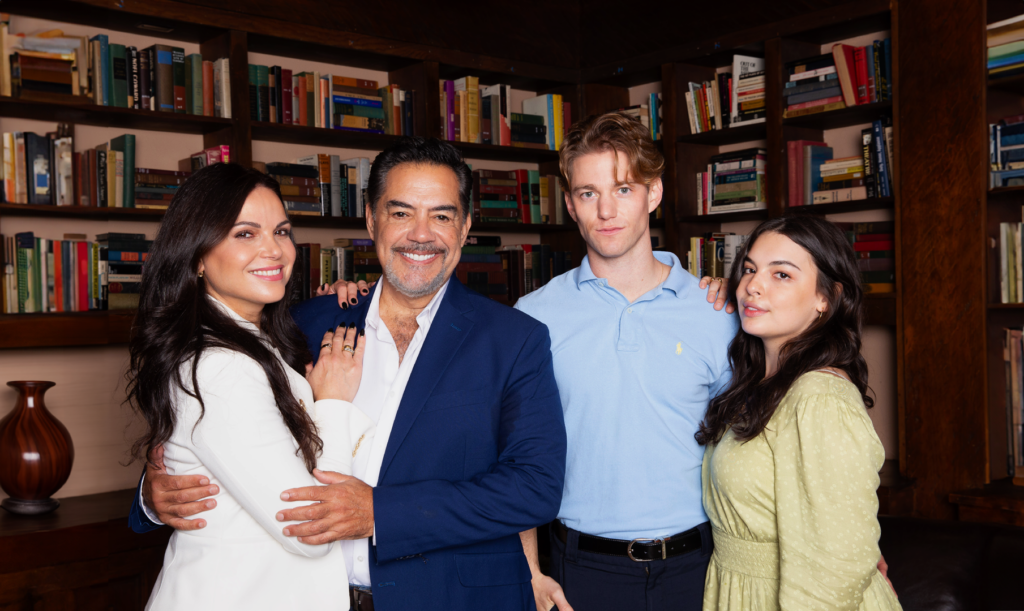By Cris Franco
What is an American? Gloria Calderón Kellett, the showrunner and co-creator of Netflix’s Emmy Award-winning One Day at a Time, explores this often-asked question in her new play One of the Good Ones premiering at the Pasadena Playhouse March 13-April 7. The action is ignited when a “perfect” Latina daughter introduces her boyfriend to her parents. The meeting reveals the family’s biases and preconceptions – to hilarious effect. A writer-actor-producer-director with the impressive credits (co-creator of One Day at a Time, creator of Amazon’s With Love and The Horrors of Dolores Roach) Ms. Calderón Kellet is one of Hollywood’s workingest television content creators. I had the privilege of chatting with her between rehearsals for One of the Good Ones. We talked about the magic of theater, the power of familia, the genius of Norman Lear and the importance of normalizing Hollywood’s portrayal of Latinos.
CRIS FRANCO (CF):
I’m so happy to speak to you. You are such a talented quadruple threat.
GLORIA CALDERON KELLETT(GCK):
GCK: Oh, that’s so nice, Cris. Can you call me every day?
CF: Sure. I’ll have my girl call your girl and while our girls are talking, we can talk – grrrl. Whew, your list of credits is very impressive! My first question is to what do you attribute your success in so many fields?
GCK: I think I’m just really a tenacious hard worker. My fellow show runner and friend, Sarah Gamble, told me that I have class president energy. The pretty blonde girl might run against me, but everyone knows that I’m gonna get the job done!
CF: And you have head cheerleader energy too. Were you a hyper-creative kid?
GCK: Yes! I sang and danced. I was really fortunate to have Cuban immigrant parents who, although they didn’t speak the language, knew the value of education because in Cuba the educational system was excellent. So they knew that the key to achieving the American dream was education. God bless my mom, she would enroll me into a class for anything I took interest in: tap, ballet, jazz, piano. They would encouraged me to try things out to see if I liked it. Of course not everything stuck. But it was privileged to have access to those classes because my parents sacrificed to pay for them since they didn’t have a ton of money. Yet, they had such immense belief in me. I’m so grateful that they allowed me to try and fail often at different things. It just gave me a willingness to learn to work my way through something if I really wanted to do it. And that’s such a gift to give your kids.
CF: Ditto. Tell me about your family.
GCK: I have a younger brother who’s a lovely guy. He lives in San Diego. We’ve always gotten along. And my parents live across the street from me.
I check in on them all the time and when my kids come home from school, they go across the street to hang out with grandma and grandpa and then come home. I often cook dinner and bring it over to them. It’s great.
CF: That’s like a sitcom.
GCK: I know. Everybody Loves Raymond in real life. And my husband, God bless him, is the best. He sees them more than I do to be honest.
CF: But it’s cool that your kids are getting that whole enriching, Old World, extended familia, multi-generational experience.
GCK: I love it. I grew up living with my grandparents and I consider it a great gift. We Latinos really value our older generation, acknowledging them for establishing our foundation. We don’t place our elderly into nursing homes. Our customs call for us to care for them.
CF: True. U.S. Latino straddle so many old and new traditions. We have a very unique family dynamic – and families is what brings us to your new play, One of the Good Ones. What does the title mean?
GCK: Well, it is left somewhat to interpretation, but it’s a play on something that I think successful Latinos often hear. I have often been told, “You’re one of the good ones.” This play it is a reversal on that. It’s a play on that verbiage. I don’t want to say too much more and spoil anything.
CF: Am I safe in assuming that drama will be triggered when the boyfriend arrives? So, it’s an unexpected coupling?
GCK: Yes. It is an unexpected coupling that launches lots of great conversation. The daughter who’s home from college has a lot of questions about her upbringing and how her parents feel about her future with the new man in her life. The evening’s conversation spurs growth, discomfort, in-fighting and ultimately, understanding. I hope audiences leave having laughed a lot and with new insights. I see my play as an invitation. Of course it’s filtered through a Latino lens because that’s my point of view.
CF: Which is honest.
GCK: Exactly. So, are there special moments for Latinos? Yes. Is there Spanish that’s not translated? Yes. But it’s okay because I know that growing-up watching American television, I didn’t know what a bar mitzvah was – but I still watched and learned. Because I’d go look it up in the dictionary. My play is an invitation to non-Latino audiences to consider what it means to be American. What did their families go through? What are the parallels with their own families?
My great mentor Norman Lear was taken with the idea of our common humanity. I think that’s why his work remains so relevant. It’s also what I try to pepper into my own work. I make sure that I am speaking specifically to a specific community while simultaneously inviting in others outside that community by showing them how we are more similar than we are different.
CF: I, too, wrote for Norman Lear and know that exploring our shared humanity was his mantra. That’s why I liked working on his shows. I also I liked Norman’s sitcoms because they played so much like theater. I know you, too, love theater and you’ve written lots of short plays.
GCK: Yes, but One of the Good Ones is my first full length play. And I’m delighted that it’s the first one out the gate.

CF: Plays inhabit such a unique space in storytelling. Being live, theater shares a real-time relationship with the audience. Plus the playwright has to sustain an idea without the breaks and instant scene changes afforded film and TV. So, I guess my question is: How do you get your playwriting head on vs. your TV writing head? Or is it the same head?
GCK: It is. My One Day at a Time was the Norman Lear-style of storytelling: a filmed play.
It was presented in long scenes largely in the proscenium of the apartment, played in one room, in real time. My new play is the same. No intermission. The actors are on stage the whole time. No scene break, no lighting changes – played in one fell swoop in 90-minutes. The audience is experiencing the events with the characters in real time because I love that tension. I love that we’re taking this journey without a break. And it’s a wonderful challenge to keep the conversation feeling natural. Like it’s moving while still having an inciting incident, a progressive complication, crisis, climax and resolution. While keeping it feeling organic so it sounds like a conversation would between these family members.
Writing wise, I love painting myself into a coroner then trying to figure my way out in an elegant manner. So, the labor of this play was making it feel like a real 90-minutes in the life of this family. There was so much joy in writing it and hearing it. I had Zoom readings with actors and I would adjust and adjust and – and then suddenly, it’s first week of rehearsal!
I had the joy of sitting with the cast and doing my last bits of tailoring. The next week you watch it and make some adjustments. I’m really fortunate to have a wonderful director Kimberly Senior who’s been so collaborative. And our cast (Lana Parrilla, Carlos Gomez, Nico Greetham and Isabella Gomez and Santino Jimenez both from One Day at a Time) many of whom I already knew, have really put their fingerprints on it – made it their own. That was all such a joyful process.
CF: This is a commissioned piece, right?
GCK: Yes, for the Pasadena Playhouse. It’s Danny Feldman’s first commission as artistic director.
CF: Regarding your adaptation of One Day at a Time, did you have to culturally adjust it for it to take place within a Latino household?
GCK: No, I didn’t. Norman was so wonderful. In sitting down with my show partner Mike and I, he (Norman Lear) said, take the mother and the two kids and do your own thing with it. It’s a single mom and she’s Latina. What would that look like for you? I didn’t watch any of the original episodes. What I did was really consider what would happen if I was divorced. Well, my mom would probably move in with me. Then Norman asked me to describe the mom. And I said that she’s like Rita Moreno.
CF: And that’s how you got Rita?!
GCK: Yes. We took the basic premise and went from there. We made the Schneider character a Canadian man-child who is also an immigrant. Finally, we updated their world to make it feel more contemporary. We didn’t reference any of the original series episodes. We just did our own thing while asking: What was it like for Latino family living in Los Angeles during the Trump administration? And that’s what we explored for the four years of that show. I had complete freedom. I was not bound by anything that the original series had done.
CF: Tell me about The Horrors of Dolores Roach? Similar to Sweeney Todd, Dolores exacts revenge on her enemies by baking them into empanadas.
GCK: Yes. That project was lots of fun and based on a play commissioned by Danny Feldman at the Labyrinth Theater Company. The Horror of Dolores Roach is how I met Danny! Back then it was called Empanada Loca starring Daphne Rubin Vega (original Mimi in Rent), written by Aaron Mark. It went up nine years ago. That became the popular podcast, The Horror of Dolores Roach, which then became the series.
CF: Your next project was your own, With Love which you conceived and wrote and acted in. That sounds exciting and exhausting.
GCK: With Love was lovely. Of course, it depends on the creator’s bandwidth. I really just wanted to do a fun small role because the demands of a leading role isn’t of interest to me. But I loved just acting in here and there, playing the funny tia who says outrages things and then leaves. That gives me time to return to video village (the control room) to make sure everthing else was fun and funny.
CF: You’re an adorable hoot as the funny tia. Did you act in college?
GCK: I did. I acted in London where I went to grad school. When I returned, I did a couple of episodes here and there between writing gigs. So, for me, acting and writing have always gone hand in hand. But I’ve always preferred the writing because I like being the boss. I might like being the boss too much.
CF: Oh, you know what I think is so great about writing? You get to be all the characters.
GCK: Yes, it’s true.
CF: Actors only get to be their one character. Writers get to explore all the characters in the whole bloody thing.
GCK: Yeah, it’s great. It’s the best.
CF: You’re quoted as saying that for you With Love’s most exciting episode was when the Diaz family simply threw a party night — like so many families do in America. You hoped that With Love would “normalize” the Latinx image on TV. I think that’s so important.
GCK: Yes. It boggles the mind to know that we are 20% of the American population and only 5% of the speaking roles.
CF: Yes. Statistically we’re less represented in the scripted media than before when you factor in the ever-growing content.
GCK: It hurts my brain because I can’t quite make sense of it. And that 5% are still largely stereotyped characters, even today. I personally take grievance with the proliferation of narco narratives. If we had other representative narratives I wouldn’t mind as much. But so many of our stories being set in that world is damaging to the community. Plus, they don’t represent the Latinos I grew up with in Oregon, San Diego and Los Angeles. They were all lovely, decent people and good citizens. I didn’t know gang bangers and drug dealers. What I saw was the hard working, kind people living their lives. And so it became really clear to me when I started in television that it was those real people that America needed to see.
CF: Why do you feel real Latinos are still so underrepresented and misrepresented? What do you think is holding us back?
GCK: More access and more yeses from execs. There’s a deep contraction happening in production right now. That is worrisome to me because our projects are always the first to get cut.

CF: That means our new stories won’t be seen.
GCK: Exactly. I’ll never forget when Benito Martinez who played the father in With Love said that it was his first TV role where he played a dad with a full family – he wasn’t a cop or a villain. He was a man who loved his wife. Oh, and when his wife, played by the legendary Constance Marie, walked into the kitchen on the set, she started crying. Constance said, “Oh my gosh – we get to have a nice kitchen?! We never get to have nice kitchen on TV.” So, it’s these small steps that hopefully will move the needle for us in the future. A future where we get to play what we truly are: just humans trying to make our way.
To see the brilliantly funny Gloria Calderón Kellett’s new comedic take on the contemporary Latinx family, be sure to catch One of the Good Ones at the Pasadena Playhouse from March 13th thru April 7th. For tickets & all show info: pasadenaplayhouse.org



